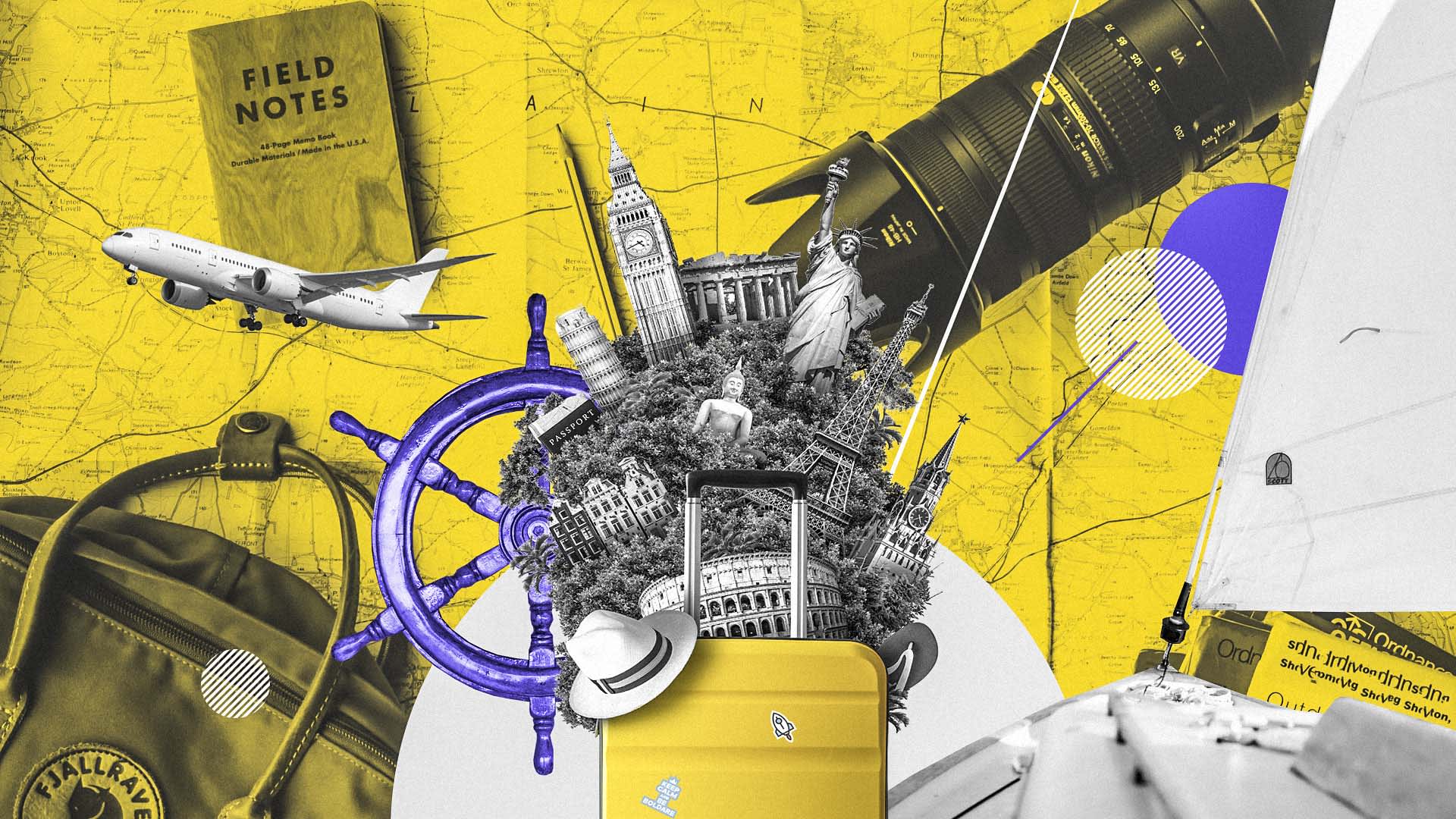Digital products in the travel industry – how Boldare is supporting the sector’s digital transformation
Digitalization is not new in the travel and tourism sector. While offline bricks and mortar travel agencies continue to operate, many customers are long-used to making their travel arrangements online, carrying out research, booking flights, transfers, hotels and even admission to local attractions via their computer or smartphone. That does not mean that the travel sector’s digital transformation is complete, far from it. Building on the foundation of online bookings, the travel industry is continually searching out new ways to satisfy customer needs and provide new services, digitally. Read on to find out about the challenges facing the travel sector, and how Boldare has been supporting the sector’s digital transformation.

Table of contents
Challenges facing the travel industry
Just a few years ago, the book “Life in the Digital Vortex” by Shan, Wade and Noronha, placed the travel industry among those most disrupted by the shift to digital services. At the time, the travel sector was highly customer-focused and increasingly online-focused. That assessment remains true and has been further augmented by the effects of the coronavirus pandemic encouraging people to conduct their lives online to an even greater extent.
For any business in the sector, the customer expectation is that any service available offline is also available online, and not only ‘online’ but specifically mobile. In the first quarter of 2021, over half of all online interactions were conducted via a mobile device (source). The challenge is not only to be available via the internet but to be mobile responsive too. In its digital form, the travel industry broadly includes review and other information sites for online research, and booking sites for transport, accommodation and access to attraction sites and facilities. More and more, digital customers expect independence and agency from the travel industry – whether it’s booking their own flights, or arranging accommodation via a network of private individuals with no hotel in sight (e.g. Airbnb). What do digital customers want from the travel industry? According to Alex Dichter and Nathan Seitzman of McKinsey & Company, quoted in a BBC article, travel customers want:
Authenticity – they want so-called ‘real’ travel experiences, as opposed to the packaged, tourist-friendly ‘lite’ version of their destination.
- Discovery – they want to find places and experiences for themselves; again, part of a desire to avoid restrictive package deals, preferring to reap the benefits of exploring locations independently (or at least, semi-independently).
- Connection – both to the destination location and to other travelers (as seen in the popularity and success of review sites, such as TripAdvisor).
- Flexibility – again, the desire not to be held hostage by an imposed itinerary.
- Personalization – travelers expect a unique experience, one that is tailored to their specific needs and interests.
- Simple transactions and processes – such as virtual boarding cards at the airport, and easy and secure online payment systems when booking.
It’s clear that all of these services and features are very achievable through the development of digital technology. To vary degrees, they can all be found already as part of the offerings from many travel sector players; whether it’s review and research resources, online booking services, or user-friendly payment options.
The solution is digital
In a VUCA world, still suffering the ongoing effects of a global pandemic, people still want to travel – though they may be more cautious about doing so and expect even more from the experience when they have it. Digital products, such as travel apps and booking platforms, are a large part of the answer and form the tools that people expect to be available. Beyond that, travel companies are increasingly looking at the deeper digital transformation of their operations and services, weaving key technologies into their day to day service delivery.
Digital transformation in the travel industry - technologies
The technologies currently transforming the travel sector include:
Mobile apps
The modern travel experience was (and continues to be) transformed by the smartphone. Travelers walk around with a map of the world in their pocket, detailed enough to show the street they’re standing on. That map is also a complete encyclopedia containing every historic building, monument, artifact or attraction that they might find interesting. Their phone also offers access to all of their travel plans and documents. No wonder that mobile apps are fast becoming the key mode of interaction between travel businesses and their customers.
A change of plans? A new destination? No problem, a few clicks on the right app and the arrangements are made.
More than just access to information, mobile apps allow travelers to board planes and trains, open hotel room doors, order room service, or find a guide for the next day’s explorations. It is now possible to travel halfway round the world and not actually interact directly with another human being.
Artificial Intelligence (AI)
Artificial intelligence is a major tool in these increasing human-digital transactions. A chatbot on a travel company’s website is available 24/7 and can be capable of handling many standard questions and issues, including reservation changes, redeeming vouchers, or checking out. With this type of digital technology, there is little need for a human employee’s time, and services can be offered in a variety of languages automatically, opening up the company’s potential customer base.
The Internet of Things (IoT)
The expanding worldwide network of connected devices equipped with sensors and processing power offers access to customer data. The travel industry can use that access, those insights into customer wants and needs, to improve and adjust the individual customer experience, making it easier to satisfy travelers’ expectations. For the travel sector, knowing the customers better tends to mean more sales; for the customer, it translates into a better, more individual experience.
Reviews & Ratings
Social media-based reviews and ratings have given the customer a greater degree of power and influence in the traveler/travel company relationship. Online review platforms create global communities of travelers, exchanging views and recommendations that can have a significant impact on a service provider’s reputation, and therefore business.
The flip side for the service provider is a more granular insight into customer views and values. Travel companies can use this information to improve services and products, engage directly with customers (both as individuals and as community groups), increase customer satisfaction, and build company credibility in the marketplace.
For the traveler, easy to use, rapid-sharing review and rating platforms have become essential sources of information, to be consulted and researched as part of planning any trip.
Virtual and augmented reality
Virtual reality is another fast-growing research technology for travelers. By creating virtual tours, travel companies open up a whole new experience to their customers. People can see their hotel room or rented accommodation before they book it. They can preview locations and attractions to create a better personal itinerary. After their trip, they can post 360-degree images on their favorite social media platform.
Once on their travels, customers may find that the visiting experience is potentially enhanced by augmented reality tours – adding new depth with extra content, videos, sound effects, music, narration, etc.
Taken to a logical conclusion, virtual and augmented reality could even mean the possibility of travel without leaving home – a potentially attractive option for people with mobility issues, and to anyone who doesn’t want to travel during a pandemic but still wants to see the world!

Investing in digitalized travel
The abovementioned BBC news story cites the World Economic Forum’s Digital Transformation Initiative (DTI) on the value of the digitalized travel industry, projecting that between 2016 and 2025, digitalization will have created over 300bn US dollars of value. There is little doubt that digitalization is not only well-established in the travel industry but is also set to continue. In the 1990s, booking a flight online was an option barely available to most travelers; today it’s the norm. Increasingly, digital technologies are at the core of travel companies’ business models. What is certain is that digitalization and digital transformation are essential strategies for any travel-based business. Whether it’s creating an MVP of a mobile app, or moving the whole business online and leaving the bricks and mortar behind, the future is digital.
At Boldare, we have experience of supporting travel industry partners in their digitalization strategies – continue reading to find out more.
Boldare helping digitalize the travel industry
At Boldare, our in-house digitalization and digital transformation has been honed and polished by a number of projects in recent years.
Experience
Our first toe in the water, working with the travel sector, was developing an MVP of a mobile app for tourists to Saudi Arabia. The core premise was to allow tourists heading for Saudi Arabia to be able to book from a variety of activities in advance, setting up a personalized itinerary.
ERES Yachting
As a global provider of luxury yacht rentals, ERES needed to move its booking platform online and take advantage of the associated technological benefits. Boldare’s role was to develop an online marketplace where people could search and filter options, make comparisons and then book and pay for the yacht of their choice. The secret to this successful platform was to focus on the user journey, breaking it down into its component parts and remaining focused on how the platform would look to the user – what impression would it convey? Using high-quality marine photos, sophisticated fonts, specific language, and subtle color tones and elegant gold detailing, the result was a highly-functional booking experience geared toward ERES’s demanding clientele: a high-end luxurious interface tailored for an affluent audience.
TUI Musement
Boldare’s latest travel sector collaboration is with TUI Musement, the tours and activities branch of global giant, TUI. In TUI’s own words, TUI Musement is in a, “perpetual state of digital transformation, with ongoing investment in digital capabilities.” While it’s too early to share the details of the work we’ll be doing together, we can say that Boldare will be working closely with TUI Musement, expanding our collaboration over time to include the development of digital products and improving existing systems (for more details read our interview with Chris Carmichael - Head of Corporate Innovation at TUI Musement).
The digital future of the travel sector
The travel industry was an early adopter of digital technologies – as witnessed by the fact that online bookings and reviews are now viewed as ‘business as normal’ and not technically innovative. There are still plenty of innovations to come, though, and travelers should continue to expect new disruptions, especially in the field of personalization, using the data gathered by widespread digitalization to further enhance and individualize the travel experience. At one end of the spectrum is the use of digital products and services to travel without the need to physically travel.
For the majority of travelers, the travel industry’s ongoing digital transformation means increasing online convenience and the ongoing automation of the essential elements of deciding where to go, arranging the journey, and then having the best possible experience and sharing it. For individual travel companies, digital transformation is a strategy to build and maintain a competitive edge, with the potential to lead the industry toward the future.

Share this article:








